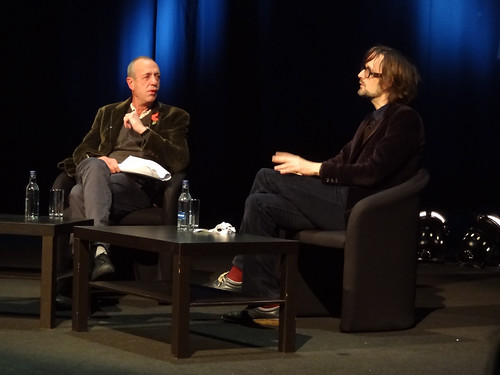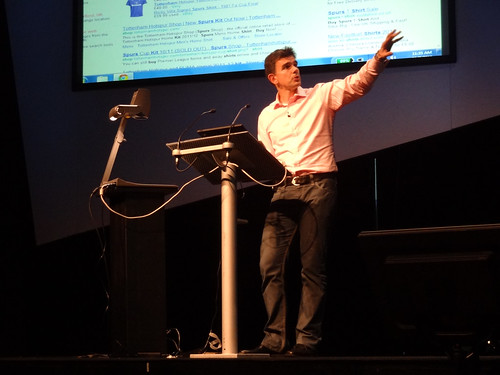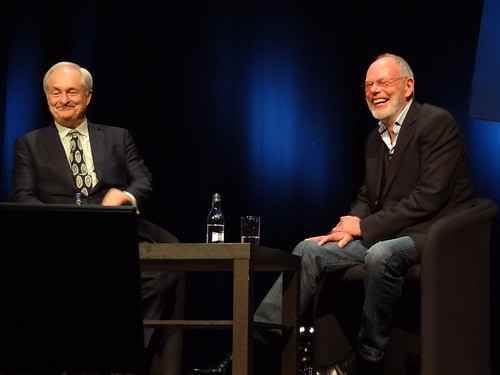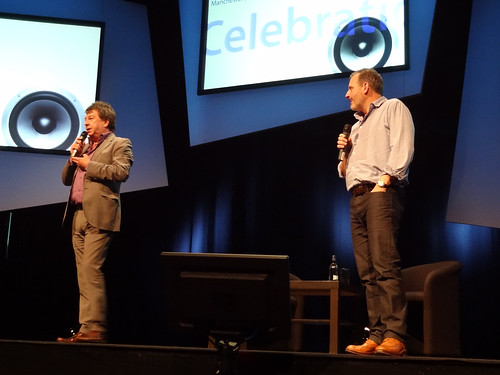
This is a continuation of my report of this year’s Radio Festival. Part one summarising TechCon can be found here, and part two summarising day one of the main festival can be found here.
The final day of the Radio Festival began with Jarvis Cocker who was in conversation with Arthur Smith. Cocker was there to talk about digital radio and in particular his efforts to help save BBC 6 Music.
Cocker referred to the comments made – in jest – by Mark Thompson the previous day, commenting, “Well he has to cover his tracks…” (He did further add, “That wasn’t his strategy…”).
He claimed that the BBC is the closest he has to a religious faith and that Radio 4 awaits all of us in the end. Although he was now finding himself discovering Radio 3.
He finished his interview with the words, “Viva 6 Music!”
As he left the stage, Absolute Radio’s Clive Dickens, RadioPlayer’s Michael Hill and Digital Radio UK’s Ford Ennals took his place.
In turn Smith interviewed each panel member. Clive Dickens spoke about Absolute Radio’s commitment to digital strategy. On a broader level, he said, the success of digital is down to people and purpose.
That could be personalities that you can find on digital like Alice Cooper on Planet Rock, Jarvis Cocker on 6 Music, or Trevor Nelson on 1 Xtra. “Purpose” is in the form of distinct programming offerings like Radio 4 Extra, Absolute 80s or Jazz FM.
Michael Hill re-iterated the success so far with RadioPlayer. But in particular, he had a fascinating visualisation of RadioPlayer usage across the day. Peak usage times come at the start of the work day and after lunch. But individual programming usage could be identified such as a Tweet sent out by Fearne Cotton on Radio 1, late night talk radio, and Champions’ League coverage.
Finally Ford Ennals took us through some of the challenges that we still face with digital radio, and spoke of the BBC’s recent national DAB roll-out commitment. He also talked about the successful recent Drive to Digital conference.
(See Clive Dicken’s slides here, at my write up of this session on the Onegoldensquare blog)
It’s worth noting that these notes represent my Radio Festival. I couldn’t get to all the sessions, and I know I missed some good ones.
Notably, there was a comedy one hosted by Jon Holmes featuring Adam Buxton, Olly Mann and Patrick Kielty that sounded like it was fantastic. And I’d have liked to have gone to the sessions discussing both local and social media. But you can’t be everywhere at once.
But as the producer of a session, I also missed a big session in Andrew Harrison’s Right to Reply. I can give you the link to his speech though. But I missed the panel discussion which featured Steve Hewlett speaking to Harrison, Orion Media’s Phil Riley, GMG’s Stuart Taylor and UTV’s Scott Taunton. I’m sure that this panel would have been well worth seeing.

The next session that I saw was the one that I co-produced with Clive Dickens. Matt Brittin, Vice President Google – Northern & Central Europe, came on with a very free-form session as he showed off some of the excellent Google products that they’ve developed of late.
Worryingly – for me at least – this was all done live on internet, and as anyone who’s been to a conference like this, that invites all sorts of gremlins. But it went remarkably smoothly.
I liked the ability to translate voice conversations on the fly with your phone. And the Chrome to Phone extension is going onto my devices forthwith!
Google Insights is a part of Google that I did know about, but had forgotten existed, and offers some very powerful research tools – completely free of charge.
For the second part of the session, Brittin sat down to take some questions. It was this part of the piece that revolved around radio a little more as Brittin suggested that radio needs to experiment more and launch new products and ideas. Not everything will work, but some will. He talked about how mobile can be used to sell offerings, as people seem to find it more acceptable to purchase through things like Google Wallet or Apple’s offerings.
Radio also has local working for it. Brittin hypothesised about a product that looked for relevant audio for you when you arrived in a new place, and let you learn about the area or its culture (in some limited ways, not a hundred miles away from the Hackney Hear app).
From there, it was back upstairs to a really interesting panel chaired by Tim Davie entitled What Next? After some opening words from Davie that set up the session, Mediatique’s Mathew Horsman presented what I thought was an absolutely excellent presentation that looked at where radio stands now – especially from a commercial perspective – and what it might do to address some of the issues it faces.
Then some further panellists – Alex Connock of Pretend TV, the FT’s Ben Fenton and Goldman Sach’s Chris Bishoff – joined Davie and Horsman for a larger debate on what radio could do.
It’s safe to say that the takeout quote came from Connock: “If we can sell the world arms, then we can sell them The Archers.”
Now while I don’t think that’s at all true – although someone I spoke to did think that The Archers’ format had once been tried elsewhere – it’s an interesting thought. Developing it, what we were really talking about was formats. In television the UK is the creator of something like half the world’s television formats, and yet that market doesn’t exist.
The closest I can think is Capital FM’s copyrighting the “bong game”. Although whether that’s stopped other stations ripping off the idea is debateable.
Overall the session was really good, although hard ideas to takeaway were tougher to come by. At one point Davie opened it up to the floor for killer ideas. Only Lisa Kerr from RadioCentre offered anything, talking about using RadioPlayer to personalise advertising and other audio dependent on location and other things we know about them.
Before the final session of the day, we got the chance to see the full list of the Radio Academy 30 Under 30, many of whom were up at the Festival.

Finally, in conversation with Paul Gambaccini was “whispering” Bob Harris. Gambaccini is excellent at this sort of thing, and deftly led Harris through his career, and talked at length about his love of Americana. A good final session of the Festival.
If I have one small criticism of the entire event, it’s that there wasn’t enough WiFi available to attendees (there was a password, but it was all a bit secret…). And perhaps a few speakers need to rethink whether we really need a three minute video as part of their session. Less is more, as they say.

Anyway, that’s it. Another Radio Festival over, and it was quite probably the best to date with so many good sessions.
I note that the Radio Academy website says that pictures and audio are coming soon. Hopefully some of the audio that I’ve mentioned will be included!
It’s also worth pointing out the Radio Academy podcast stream which features lots of interviews put together during the Festival.
The Guardian’s John Plunkett recorded a Media Talk at the Festival featuring most of the main speakers (listen for Matt Brittin’s shoutout!).
And Steve Hewlett recorded an episode of Radio 4’s Media Show coming from the Festival (including a good interview with Dee Ford that’s well worth listening to).
Radio Today provided stacks of live blogging from the Festival as well as plenty of reports.
And the Techcon audio can all be found on their Audioboo channel
.
Congratulations to the whole team at the Radio Academy for organising it all, the production teams at the venue, and the producers of each session who did such an amazing job (and I don’t say that just to pat myself on the back either!).
Roll on 2012…
Disclaimer: I attended Radio Festival because I’m employed by Absolute Radio. However, these are my views, and don’t necessarily reflect those of my employer. Not that I’ve said anything too contentious… well apart from this bit at the end
Radio Festival 2011 Report: Part Three – Festival Day Two
Tags:
